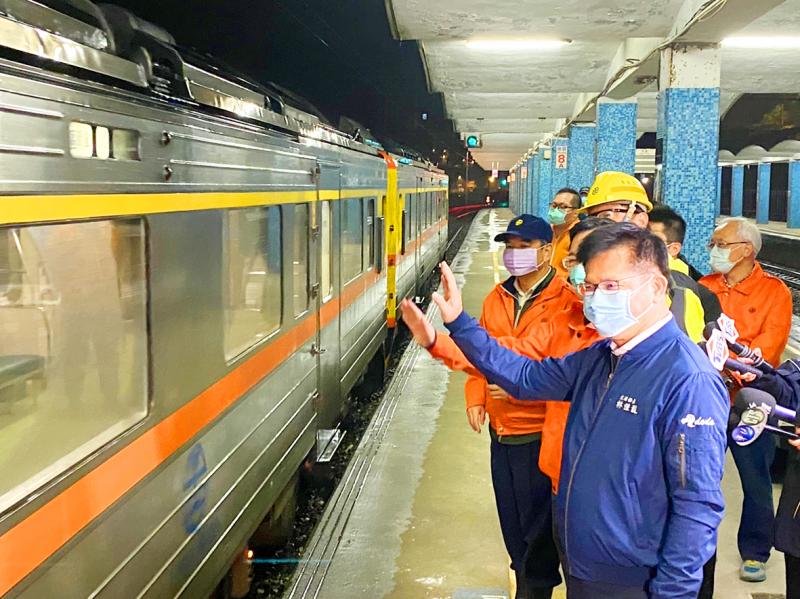The Taiwan Lantern Festival is to be held in Kaohsiung in 2022 and in Taipei in 2023, the Ministry of Transportation and Communications said yesterday.
The Tourism Bureau had formed a selection committee to choose the cities to host the festival in 2022 and 2023, with Tainan and Kaohsiung showing an interest in hosting the festival in 2022 — the Year of the Tiger on the Chinese Zodiac.
However, as Tainan did not submit a business plan for the event, the committee handed the right to host the flagship tourism event in 2022 to Kaohsiung, it said.

Photo: Yu Chao-fu, Taipei Times
The Kaohsiung City Government’s plan is to hold the main lantern exhibit at the Asia New Bay Area, a 600-hectare property at the Port of Kaohsiung that the city is using to attract foreign investments, the bureau said.
The National Kaohsiung Center for the Arts, also known as the Weiwuying (衛武營), would also be a major exhibition area, it said.
For the festival in 2023, which would be the Year of the Rabbit, the bureau had invited the governments of Taipei, New Taipei City, Keelung and Yilan County to submit plans for the event.
The committee reviewed the proposals based on several criteria, including transportation systems, hotels and accommodation capacity, safety management, marketing strategies and fundraising ability, it said.
Taipei’s plan was ranked first by the committee, with its proposed main exhibition area covering major tourist attractions surrounding the Taipei City Hall, including the Sun Yat-Sen Memorial Hall, Songshan Cultural and Creative Park, Hsinyi Special Area and Forty-Four South Village.
The last time that Taipei and Kaohsiung hosted the annual lantern festival was in 2000 and 2002 respectively.
Minister of Transportation and Communications Lin Chia-lung (林佳龍) had approved the committee’s decision, the ministry said, adding that the Executive Yuan would give its final approval.
The bureau created the Taiwan Lantern Festival in 1990, which has since become one of the nation’s major tourism events. The festival was held in Taipei from 1990 to 2000, and in Kaohsiung in 2001 and 2002. Starting in 2003, local governments alternated in hosting the event.
In other news, the nation’s eastern and southern regions remain the favorite travel destinations during the New Year long weekend, bureau statistics showed.
The same trend was seen in the summer break, as well as the Mid-Autumn Festival and Double Ten National Day holidays, as international travel remain restricted due to the COVID-19 pandemic.
As of Wednesday last week, the average hotel occupancy rate from Dec. 31 to Jan. 2 in the eastern region was 62 percent, the highest among the regions, the bureau said.
The southern and central regions ranked second and third, with an average hotel occupancy rate of 49 percent and 47 percent respectively, it added
Meanwhile, the average hotel occupancy rate is 40 percent in Taipei and 21 percent in the nation’s outlying islands, it said.
Among hotels on the east coast, those in Taitung County have the highest occupancy rates, which might have something to do with pop diva A-mei’s (阿妹) New Year Eve’s concert at the International Landmark Seaside Park in Taitung City, the bureau said.
The Taitung County Government also said that the county expects more than 50,000 travelers to visit during the New Year holiday, adding that 40,000 people planning to attend the concert have already signed health declaration forms online.
The average hotel occupancy rate in the outlying islands is lower in the winter due to the weather, the bureau said.

Taiwanese can file complaints with the Tourism Administration to report travel agencies if their activities caused termination of a person’s citizenship, Mainland Affairs Council Minister Chiu Chui-cheng (邱垂正) said yesterday, after a podcaster highlighted a case in which a person’s citizenship was canceled for receiving a single-use Chinese passport to enter Russia. The council is aware of incidents in which people who signed up through Chinese travel agencies for tours of Russia were told they could obtain Russian visas and fast-track border clearance, Chiu told reporters on the sidelines of an event in Taipei. However, the travel agencies actually applied

Japanese footwear brand Onitsuka Tiger today issued a public apology and said it has suspended an employee amid allegations that the staff member discriminated against a Vietnamese customer at its Taipei 101 store. Posting on the social media platform Threads yesterday, a user said that an employee at the store said that “those shoes are very expensive” when her friend, who is a migrant worker from Vietnam, asked for assistance. The employee then ignored her until she asked again, to which she replied: "We don't have a size 37." The post had amassed nearly 26,000 likes and 916 comments as of this

New measures aimed at making Taiwan more attractive to foreign professionals came into effect this month, the National Development Council said yesterday. Among the changes, international students at Taiwanese universities would be able to work in Taiwan without a work permit in the two years after they graduate, explainer materials provided by the council said. In addition, foreign nationals who graduated from one of the world’s top 200 universities within the past five years can also apply for a two-year open work permit. Previously, those graduates would have needed to apply for a work permit using point-based criteria or have a Taiwanese company

The Shilin District Prosecutors’ Office yesterday indicted two Taiwanese and issued a wanted notice for Pete Liu (劉作虎), founder of Shenzhen-based smartphone manufacturer OnePlus Technology Co (萬普拉斯科技), for allegedly contravening the Act Governing Relations Between the People of the Taiwan Area and the Mainland Area (臺灣地區與大陸地區人民關係條例) by poaching 70 engineers in Taiwan. Liu allegedly traveled to Taiwan at the end of 2014 and met with a Taiwanese man surnamed Lin (林) to discuss establishing a mobile software research and development (R&D) team in Taiwan, prosecutors said. Without approval from the government, Lin, following Liu’s instructions, recruited more than 70 software